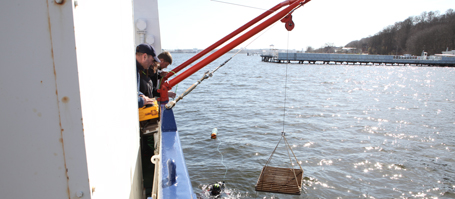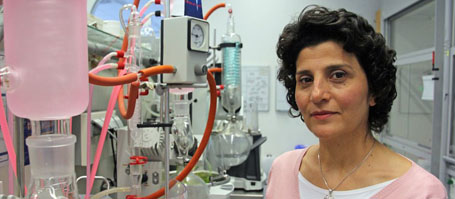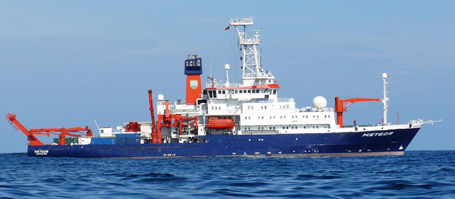The position paper was developed starting in 2013 at the invitation of the DKK by more than 80 scientists and experts and constitutes a consensus of the leading climate researchers and climate impact researchers. It defines three central topic areas which should be the focus of science, society and politics in the next ten years and to which German research can make valuable contributions. The three topic areas are: Closing the gaps in the understanding of the climate system, the way in which climate risks are handled and the role of climate research in a democratic society with the aim of developing better adapted forms of policy consulting.
(Press release of the German Climate Consortium)
Understanding climate: Closing knowledge gaps and making more reliable projections for the future
It is scientifically undisputed that the climate of the earth is changing and that since the middle of the 20th century humans are the main cause for the warming of the earth. The DKK chairman Mojib Latif emphasized: “In particular, excellently positioned German climate research has had a leading role in contributing to the fact that the current state of knowledge has been recognized world-wide today. Despite enormous progress in the research of the climate system there are still considerable gaps in understanding. Therefore, in-depth research of processes in the climate system occupies a central place in climate research.”
In order to achieve a better understanding of the system in their DKK position paper, climate researchers call for the expansion and creation of climate observation systems. Moreover, they argue that a national modeling strategy would be necessary to decrease the number of mistakes in climate models and, in particular, to be able to make more accurate regional climate prognoses. Another project: A seamless forecast system which ranges from the classic weather forecast over a short-term climate forecast to a prognosis of climate over seasons, decades and, finally, centuries. According to the authors of the paper, the first step for the upcoming years would be the prolongation of the weather forecast and its connection to short-term climate prognosis. This is the connection which is still missing up until now and which would allow planning the availability of nutrition, water and energy for longer time frames and being better prepared for extreme weather events.
Handling climate risks: Creating the basis for risk managementThe societal and economic impacts of climate change are difficult to estimate. To a large extent they lie in the future and are dependent on many local factors.
Nevertheless, the risks which are created as a consequence of climate change have to be identified and characterized more precisely and – where possible – quantified in relation to the probability and the extent of damage. Governments, businesses and civil society need sufficiently secure knowledge, in order to adapt to unavoidable climate change and, at the same time, to restrict climate change through profound changes – keyword: Low Carbon Society. However, so far, there is no risk management based on the best information from climate science that allows for a better weighing of the benefits and disadvantages of climate policy decisions.
Therefore, In the DKK position paper scientists and experts propose ways to create better knowledge of future climate risks. They call for stronger interdisciplinary collaboration between natural and social scientists as well as for transdisciplinary collaboration with partners from politics, business/industry and civil society. While the social sciences should identify the economic and social consequences of climate change and indicate possible development paths, partners from outside academia have to be involved in order to identify the questions and research priorities most relevant for society.
The environmental economist Gernot Klepper points out the consequences of this procedure; “It is not necessarily the least known climate phenomenon that has priority in research. Research should rather focus on climate phenomena where the knowledge deficit is connected to high societal damage and costs, or where politics has to make decisions soon, for example, concerning the implementation of the energy transition. Here, scientists have to provide a better basis for decisions.”
Climate research in a democratic society:
New research fields and accurate political consultancy
Because dealing with climate change is, first of all, linked to implementation problems, the demand for science-based consultancy on options for action for society and possible solutions is rising. The political scientist Silke Beck explains: “Therefore, scientists must understand better under which conditions transition is possible in a democratic society, what role climate researchers can play in this process and what options are required by political consultation. New research questions resulting from this must be included in the fundamental research of the social sciences.”
The researchers and experts attach great importance to a systematic enhancement of science-based political consultancy in a continuous dialogue with the actors and institutions involved. In a first step, an empirical assessment of the existing consulting options should be undertaken and then research should be done on whether the instruments and structures are suitable for the questions and aims. Climate researchers criticize that hardly any research has been done on the impacts of climate protection policies such as emissions trading, and call for so-called ex-post analyses.
The German Climate Consortium is shaping the structural transformation in climate research
The DKK chairman Mojib Latif explains the three major areas of the position paper which go beyond classical climate research: “In relation to climate change it is not so much a problem of knowledge but rather, in particular, an implementation problem. Increasingly, solution options which have to be legitimized and accepted by a democratic society are at the center of attention. Concrete climate risks have to be handled and the question must be weighed whether humans can adapt to these or whether they need other protection or support. It is clear to see: Value-based decisions and questions of justice must also be considered.Science is only one among many actors – albeit, with a special role and responsibility. The German Climate Consortium fosters scientific research on these questions and enables a substantive debate about the challenges posed by climate change.”
DKK Managing Director Marie-Luise Beck says: “The increasing demand for understanding climate change and for promising solutions are leading to a structural change in climate research. Many initiatives from the German Ministry of Research and research institutes are reacting to this. As the umbrella organization of climate researchers, the German Climate Consortium is striving to be part of the development of the structural transition. With the position paper, we aim to initiate new research and consulting processes. We speak with one voice and are a central contact point for politics and the public on questions concerning climate change.”
Follow the link to find the DKK position paper for download
www.deutsches-klima-konsortium.de/de/veroeffentlichungen/publikationen.html
If you have further questions please contact
Eva Söderman, Spokesperson for Public Relations
Deutsches Klima-Konsortium e.V. (DKK)
Wissenschaftsforum, Markgrafenstraße 37, 10117 Berlin
Tel.: +49 (0)30 76 77 18 69-4 | Fax: +49 (0)30 76 77 18 69-9
E-Mail: eva.soederman@klima-konsortium.de
Internet: www.deutsches-klima-konsortium.de
The German Climate Consortium e.V. represents leading actors of German climate research and climate impact research. This includes universities, non-university research institutes and federal departments. The DKK stands for a science-based political consultancy, addresses current issues and provides background information from an expert view.
…



